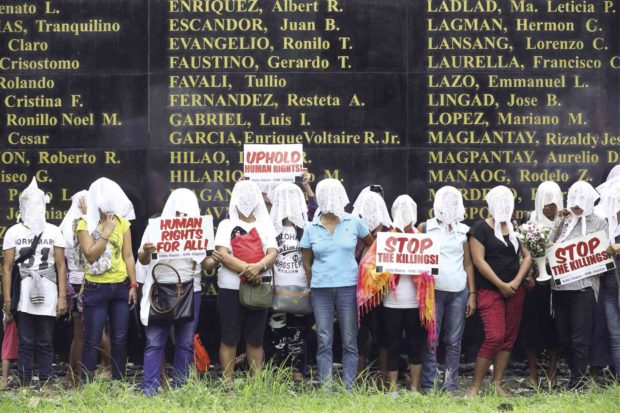Malacañang rejects UN rights investigation of drug killings

Credit to Author: racosta| Date: Fri, 05 Jul 2019 21:14:08 +0000
Malacañang on Friday rejected a call by some members of the UN Human Rights Council (UNHRC) to probe the growing number of killings in President Duterte’s war on drugs, saying it was interfering in the country’s sovereignty.
Presidential spokesperson Salvador Panelo said no foreign government “knows the actual and real state of our country’s domestic affairs better than this government.”
“Any attempt therefore by any foreign country to interfere with how this government maintains its peace and order, not only is an affront to their intellect but an interference with the country’s sovereignty as well,” Panelo said in a statement.
Justice Secretary Menardo Guevarra on Friday said the Duterte administration should not be told by anyone, including the United Nations, to stop “extrajudicial executions” because it was never the government’s policy.
“In any event, our government is prepared to face any inquiry if the same becomes necessary to disabuse the minds of those who rely on or give undue credence to selective, if not biased, secondhand information,” Guevarra said in a statement.
Iceland on Thursday submitted a draft resolution, backed by mainly European states, formally calling for a UN investigation of the thousands of killings in the drug war.
The Duterte administration has insisted that the more than 6,500 suspected drug dealers and users killed by police in antinarcotics operations had all put up a fight.
‘Unreliable’ police accounts
“Police accounts of drug raids are not reliable and the officers enforcing the ‘drug war’ have been shown to plant weapons and drugs to justify the killings,” Laila Matar of Human Rights Watch told the UNHRC this week.
Activists say that at least 27,000—including Myka Ulpina, a 3-year-old girl fatally shot during a police raid last weekend in Rodriguez, Rizal province—have been killed since Mr. Duterte took office in 2016 on a platform of crushing crime.
“In a nonarmed conflict context, this is the worst case of extrajudicial killings globally,” Ellecer “Budit” Carlos of the Manila-based group iDefend told Reuters news agency.
The Geneva forum is to vote on the resolution before ending its three-week session on July 12. The Philippines is one of its 47 members.
Carlos conceded that Asian countries were unlikely to vote in favor of the resolution, adding: “I think it will be a close shave.”
No Asian support
One Asian ambassador, speaking on condition of anonymity, indicated that his country would not support it, telling Reuters: “There are worse things happening in the world.”
Panelo said the administration respected human rights and would punish those who violated them.
“The fact that the Philippines, during the term of President Duterte, has been elected to the UN Human Rights Council with 165 out of 192 votes at the UN General Assembly bespeaks the growing appreciation of the international community on our policies with respect to human rights,” Panelo said.
More circumspect
He asked UN members “to be more circumspect in evaluating reports concerning the domestic affairs of other countries.”
But activists say the council and the office of the UN High Commissioner for Human Rights, Michelle Bachelet, must shine a light on the situation in the Philippines.
Matar said the drug killings were occurring in the wider context of “attacks on human rights defenders, media activists, journalists, anyone who really dares to speak up against the killings.”
Iceland has always been one of the countries vocal about their concern over Duterte’s bloody campaign.
In September 2017, Iceland and 38 other countries signed a joint statement calling on the Duterte administration to uphold the “universal principles of democratic accountability and the rule of law” in resolving the thousands of killings in his war on drugs.
They also asked Mr. Duterte to allow the UN special rapporteur on extrajudicial killings, Agnes Callamard, to visit the Philippines without conditions. This was rejected by Manila.
At the 37th session of the UNHRC meeting in Geneva in February 2018, Iceland Foreign Minister Gudlaugur Thór Thórdarson urged Manila again to accept a visit from Callamard.
During the same meeting, then Foreign Secretary Alan Peter Cayetano delivered a speech attacking Callamard for supposedly prejudging the President and human rights groups for spreading misinformation. —WITH REPORTS FROM JEROME ANING, INQUIRER RESEARCH AND REUTERS